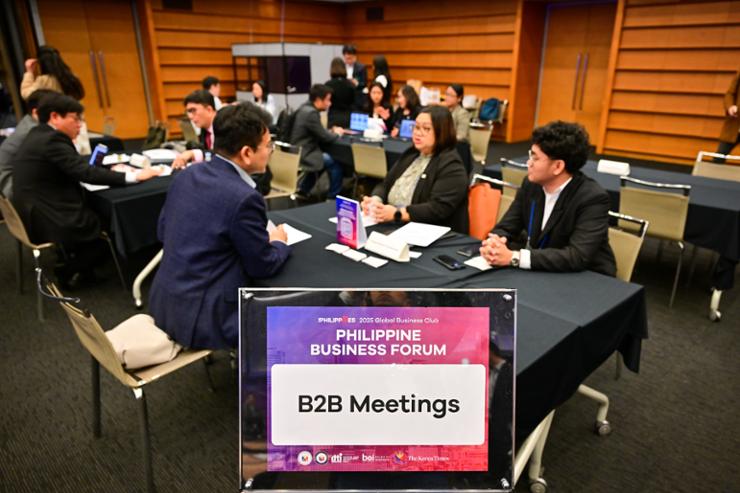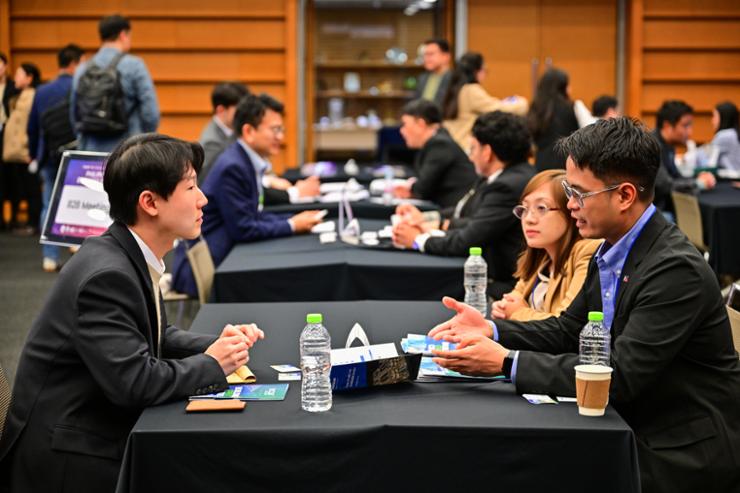By KIM HYUN-BIN
Philippine officials made a fresh pitch to Korean companies to invest in sectors ranging from defense to clean energy, highlighting new incentive packages and strategic opportunities during a business-to-business meeting (B2B) held at the Korea Chamber of Commerce in Seoul on Monday, April 7.

Officials from the Philippine government, the corporate sector and Korean companies discuss investment opportunities during a business-to-business meeting held on the sidelines of the Philippine Business Forum at the Korea Chamber of Commerce and Industry in Seoul, Monday. (Korea Times photo by Choi Won-suk)
The event, held on the sidelines of the Philippine Business Forum, was aimed at boosting bilateral economic cooperation and drawing Korean firms into the Philippines’ ambitious push for industrial modernization.
Secretary Frederick D. Go, special assistant for investment and economic affairs, delivered the keynote address at the Philippine Business Forum in Seoul, highlighting the first stop of the country’s CREATE MORE international roadshow, under the slogan "Making Investments Happen in the Philippines."
The event was hosted by the Philippine Board of Investments (BOI) and the Philippine Trade and Investment Center in Seoul and organized by the Philippine Embassy in Korea, the Office of the Special Assistant to the President for Investment and Economic Affairs and The Korea Times.
Gene Angelo Ferrer, the Aurora Pacific Economic Zone's manager of the business development and marketing division, said, “We’re looking for locators and investors in the Philippines."
"With the meetings we have now, we hope to ensure that the Philippines and Korea have balanced trade — and beyond that, strengthen the defense industries of both countries.”
Ferrer said the Philippine government has adopted a “self-reliant defense posture” policy, seeking to develop a domestic defense industry with technological support from allies like Korea.
“We just had a meeting with Starcom, which specializes in anti-drone technology,” he said. “Given the proximity of the Philippines to the Pacific Ocean and the West Philippine Sea, this type of technology would be a huge asset — especially if tensions escalate.”
Vivian Santos, deputy director general for operations at the Philippine Economic Zone Authority (PEZA), highlighted that recently passed legislation provides long-term incentives for foreign investors, particularly those in the high-tech and sustainability sectors.
“This new law has put the Philippines in a better position than before,” Santos said. “If a project is considered highly desirable with a minimum investment of $1 billion, it can receive up to 40 years of incentives — including potential presidential subsidies.”
She added that PEZA provides “red carpet treatment” for investors. “We are a one-stop, non-stop shop. Once you invest in PEZA, you only deal with us for all permits,” she said.
Santos also urged Korean tech giants to expand operations in the Philippines, pointing to Samsung’s existing presence in the country. “We know how big Samsung is. Most of their major investments were in Vietnam, but maybe now is the time to look again at the Philippines for expansion.”
Patrick Aquino, director of the energy utilization management bureau at the Philippine Department of Energy, also made a strong case for Korean companies to tap into the country’s clean energy and electric vehicle sectors.
“Well, of course, the Philippines is a growing economy,” Aquino said. “We’d like to get investments and encourage investments in power generation, specifically electric vehicles. We have really good legislation and policies in place.”

Officials from the Philippine government, the corporate sector and Korean companies discuss investment opportunities during a business-to-business meeting held on the sidelines of the Philippine Business Forum at the Korea Chamber of Commerce and Industry in Seoul, Monday. Korea Times photo by Choi Won-suk
Aquino noted ongoing discussions with Korean firms in battery storage, EV components and mineral processing for energy storage.
“We’re echoing the robust incentives coming in the EV incentives strategy,” he said, “to further enhance the value proposition of bringing in those capacities locally,” Aquino said.
He also revealed that the Philippine government is in discussions with Korea Hydro & Nuclear Power following a memorandum of understanding signed last October.
“We’re pursuing further talks for a feasibility study on potential nuclear power projects,” Aquino said. “That’s something I’m also following up on during this visit.”
Among the Korean firms attending, energy and defense companies expressed growing interest in the Philippines as a regional base.
“Our fuel cell business has mostly been in Korea and the U.S., but we’re looking to expand into Southeast Asia,” said a representative of a Korean fuel cell company. “The Philippines stands out due to high electricity prices and island-based cities with weak grid connections. Our distributed power systems could be a great fit.”
A Korean defense company representative echoed that sentiment, noting the island nation’s maritime vulnerabilities.
“Given that the Philippines is surrounded by sea, there’s strong interest in strengthening their defense sector,” the official said. “We see this as an opportunity to expand through local partnerships.”